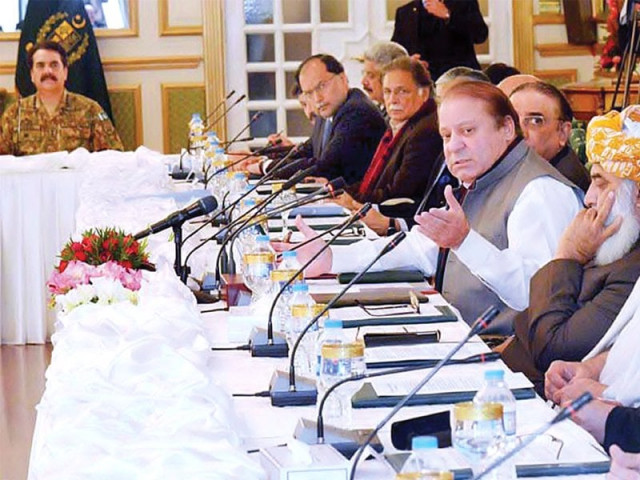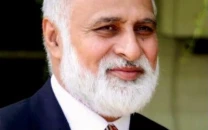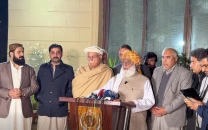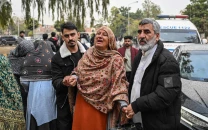Special courts: Consensus emerges on constitutional cover
APC agrees on swift implementation of other points of National Action Plan

PM Nawaz addresses the all parties conference on Friday. PHOTO: APP
The country’s top political leaders on Friday reaffirmed their resolve to implement the 20-point National Action Plan against terrorism and agreed to amend the Constitution to provide a legal cover to proposed special courts to be set up to try terror suspects.
“The all parties conference… endorsed the proposed legislative measures, including amendments in the Pakistan Army Act 1952, to extend its jurisdiction for speedy trial of cases under specified acts and provide a constitutional cover with a sunset clause of two years from the date of enactment,” reads a joint declaration issued at the end of a five-hour-long meeting at the Prime Minister House.
Attendees at the marathon huddle included all top leaders of parliamentary parties as well as military brass, including army chief General Raheel Sharif and ISI chief Lt Gen Rizwan Akhtar. In his opening remarks, Prime Minister Nawaz Sharif praised the participants for their political acumen and maturity, saying the demonstration of national unity was a bright chapter in the annals of the country’s political history.
“The national leadership was swift enough to finalise the recommendations through a committee within seven days and the party leaders agreed on the 20-point plan on counter-terrorism,” he said, adding that the political and military leadership have taken decisions for the country’s better future. “A national strategy is being implemented with the support of the nation,” he added.
The prime minister said the draft constitutional amendment bill would soon be tabled in the National Assembly for its passage as early as possible. Sources, however, said the bill would be tabled today (Saturday), which is likely to sail through on Monday.
The prime minister said there was no room for debate on the bill in the National Assembly, owing to its urgent nature. “Besides, the government has also done marathon sessions to deeply examine the draft while the army chief has also done brainstorming on the issue,” he said. “The ‘Sunset Clause’ will be in effect for two years and the nation will see its positive results”.
On his part, Gen Raheel described the war against terrorism a ‘national war’ that would have to be won at any cost. He said the support extended by the political leadership was their strength.
Earlier all major political parties threw their weight behind the government. PPP Co-Chairman Asif Ali Zardari said his party fully supported the government in the fight for elimination of terrorism as ‘it is a national mission’. PTI chairman Imran Khan said: “Mr Prime Minister! We fully support you in this mission”.
PML-Q President Chaudhry Shujaat Hussain said: “Without indulging in legal and constitutional hitches, we should think about the mothers who have been deprived of their kids permanently.” MQM leader Dr Farooq Sattar said his party fully supported the idea of establishing military courts in the country.
Proposed bill of constitutional amendment
The bill includes four to five clauses for military courts. According to sources, the jurisdiction of military courts is being extended.
One of the clauses is about proposed amendment in Clause 2 (1) (d) of Pakistan Army Act 1952, in which certain offences – defined under the Protection of Pakistan Ordinance Act (POPA) Act 2014 and the Anti-Terrorism Act 1997 will be included – to hold trial of civilians.
In military courts, substantive crimes are dealt by court martial while capital punishment offences are dealt by field general court martial.
The offences – like attacks on community, state buildings, schools, cantonment areas, army installations, electricity, communication infrastructure etc, will be dealt in field general court martial. These offences are related to collective national damage. The last appeal in field general court martial is made to the chief of the army staff.
The defence Ministry will send the names of terrorists, which it wants the field general court martial to the federal government and on its approval military courts will be able to try that civilian terrorist. The legal experts maintain that by devising this mechanism of approving trial, the government has established a fair system of check and balance on military courts.
Constitutional cover
In order to give a constitutional cover, the APC agreed to put two acts of POPA 2014 and ATA 1997 in first schedule of the Constitution which exempts it from the operation of Article 8 (1)(2) [of fundamental rights] and Article 175 (2) [regarding jurisdiction of courts].
Article 8 is about fundamental rights. Under the Army Act 1952 the army personnel can neither claim his fundamental rights nor move a civilian court. Now after putting certain offences of POPA and ATA in schedule 1, the civilian terror suspect will also not be able to move a civilian court.
Article 175 (2) states no court shall have any jurisdiction save, as is or may be conferred on it by Constitution or by or under any law. The sub-clause 3 of the Article states the judiciary will be separated from the executive.
Sources said by putting two laws [acts of POPA 2014 and ATA 1997] under schedule 1 of the Constitution, the government has created provision of constitutional cover to military courts and to justify spirit of Article 175 (2)(3).
The other clauses of proposed bill are about its two-year time bar. Other technical amendments like the FATA Regulations 2011, the Pakistan Navy Act and the Pakistan Air Force Act will also be carried out in the proposed bill.
Published in The Express Tribune, January 3rd, 2015.



















COMMENTS
Comments are moderated and generally will be posted if they are on-topic and not abusive.
For more information, please see our Comments FAQ